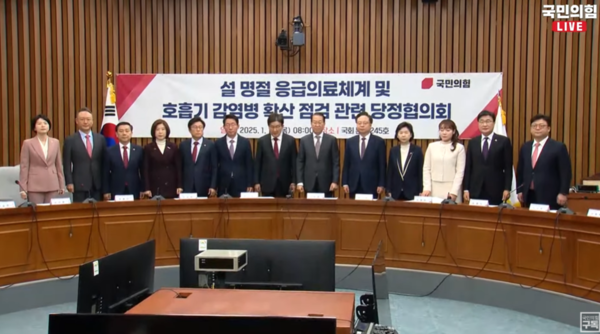The government and its party have decided to designate the Lunar New Year holiday as “emergency response week,” focusing on improving the emergency medical system to minimize medical gaps.
For instance, they will try to secure hospitals and clinics that remain open during the Lunar New Year holidays to prevent overcrowding in emergency rooms and increase treatment fees for emergency medicine specialists by 250 percent.
The ruling People Power Party (PPP) and the government agreed on this and other steps at a meeting Thursday to prepare an emergency medical system during the Lunar New Year holidays and prevent respiratory infectious diseases this winter. The emergency response week will run from Feb. 22 to March 5.

During the two weeks, the government will increase the additional rate for severe and emergency surgeries performed at 181 regional emergency medical centers at night and on holidays from 200 percent to 300 percent. The 250 percent increase in emergency room doctor fees and 150 percent increase in emergency medical procedures at regional and base centers, which have been in effect since last year's Chuseok holiday, will also be maintained.
The government will also deploy one-on-one officers to 413 emergency rooms nationwide for intensive management.
To minimize overcrowding in emergency rooms considering the increase in respiratory diseases, including flu and Covid-19, 115 fever clinics and 197 partner hospitals for respiratory diseases will support intensive care. When a patient confirmed with Covid-19 is hospitalized at a partner hospital, the government will provide 200,000 won ($137) in allocated support.
An additional 15,000 won will be provided for non-severe emergency cases that visit 233 local emergency medical centers and 113 emergency medical facilities to relieve overcrowding in large hospital emergency rooms.
In addition, a dedicated obstetrics and neonatal team will be established in the Central Emergency Medical Situation Room during the Lunar New Year holidays to support the prompt transfer of high-risk mothers and newborns. The government will set up a separate hospital bed situation board, expand the on-call system for obstetric emergencies, establish provincial high-risk maternal and neonatal response hotlines, and provide incentives to hospitals that reserve NICU beds for multiple births and expand medical staff on-call.
It will also support pediatric care by encouraging night and holiday operations at 103 night-time hospitals for children and 114 daytime children's hospitals. Ten new regional cardiocerebrovascular centers will also be designated.
Besides, the government plans to secure and operate as many hospitals, clinics, and pharmacies as possible during the Lunar New Year holidays to fill the gap in outpatient medical care. For hospitals, clinics, and pharmacies that open during the Lunar New Year holiday, the government will add 20 percent to the holiday consultation fees and pharmacy manufacturing fees.
The government will also monitor disaster situations 24/7 and maintain a system for dispatching health center rapid response teams and disaster area medical centers (DAMTs).
“The government and the governing party acknowledged the efforts of medical professionals and agreed that we should continue to provide human and material support to ensure the stable provision of healthcare services during and after the holidays,” said Rep. Kim Sang-hoon, chief policymaker of the ruling PPP. “We also ask the public to avoid emergency rooms at large hospitals and use neighborhood clinics and pharmacies for seriously ill people during the holiday.”
The Korean Society of Emergency Medicine positively assessed the plan.
“It's positive. It seems to be more advanced in details than the last Chuseok holiday,” said Lee Kyung-won, a public relations director at the society and a clinical professor at Yongin Severance Hospital.

